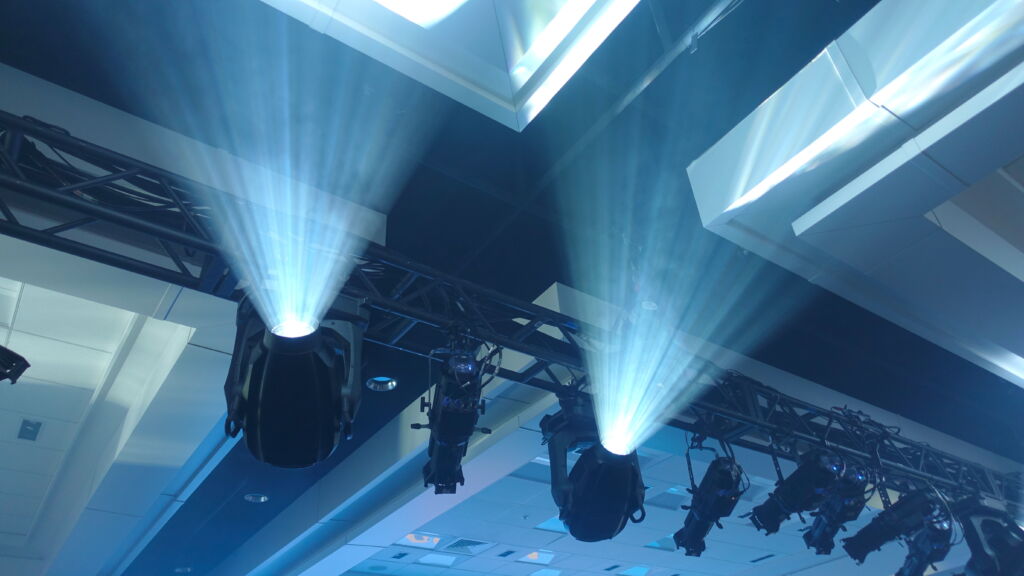When planning an event there are many factors to consider and one of the most important is the audio visual (AV) setup. AV can include everything from simple microphone and speaker rentals to a full-blown stage production with lighting, sound, and video. Any venue or AV Company can purchase the same equipment… so it really comes down to the capabilities and professionalism of the staff that runs it.
Working with the same trusted team year after year no matter the venue or city can be one of the easiest ways to alleviate event stress and add consistency to your event. Your Production Team knows your event and are able to make changes and improvements each year. With the right AV partner and a multiyear contract, the cost of transporting gear and staff can be comparable or potentially less expensive than using the in-house provider. In-house AV providers usually only have your event for one year and don’t have incentive to go above and beyond for your event needs.
Hotels and other venues will often dissuade you from bringing in your own team to handle your audio visual needs. Usually they get a percentage of the total AV spend (up to 30%) and that is reflected in the pricing you will receive. No hotel or venue can make you use their in-house team for AV Services, but they will try to make it difficult for you.
You have a trusted AV Vendor – Here are some things to look for in your venue contract:
Venues have come up with many ways to generate revenue when you bring outside audio visual vendors. When you do plan on bringing your own AV team we would suggest looking closely at the contract and have your AV company review it. You will want to look for the following items before you sign because you may be able to negotiate some concessions so that you will not be hit with charges after the fact.
Rigging Fees or Rigging Exclusivity
Fees per point : Charges billed per rigging point being used in the event space. These fees may or may not include rigging labor.
Exclusivity for rigging equipment: Some venues require that all equipment being flown or suspended by ground support structures must be rented from the in-house provider. This can be all truss, motors, and rigging essentials. This is becoming more prominent across the county, and is intended to reduce liability for the venue. This is something that you cannot usually negotiate out of your contract, but it is good to know when you are signing because you can at least budget for it.
In-house rigging manager for load-in and load-out: If the venue does not require the use of their own equipment for rigging they usually require their own in-house Rigging Manager to oversee that the rigging is being done safely and not exceeding the weight capacity of the space. This is also something that is non-negotiable and should be budgeted for in the planning stages of your event.
Load-cells: Some venues are starting to require load-cells for all rigging points. Load-cells are small digital scales that give the weights that are on each motor. If the venue requires the use of load-cells you may see an additional cost to your event budget.
Power Service Costs
Venues have started charging exorbitant fees for power as an extra revenue stream for every event. Some may only charge for using 3-phase for the rooms that have larger power needs. Some venues are now charging up to $50 per wall outlet per day. In a larger scale event with multiple breakout rooms this can get expensive quickly.
Labor Requirements
In-house Labor: Every venue has specific local or in-house labor requirements. If you are using your own AV provider you may be required to hire an in-house technical liaison. This is a house staff member assigned to ensure that the Service Standards are in place as well as providing instant access to a Hotel representative who can supply needed information to the Third-Party Suppliers. If you are planning a large event you may need multiple liaisons for different event spaces or floors.
Union Contracts: Another important thing to consider when selecting a space for your event is whether or not the venue has a contract with a local labor union. These contracts may require union techs to operate all audio visual equipment or “shadow” your own AV vendor’s technicians.
Outside Vendor Fees
In addition to shadow labor, power, and rigging fees some venues may also add additional charges for using outside AV vendors. They are usually labeled as a “Client Assurance Package” or “Event Success Fee”. These fees can usually be waived as a concession prior to signing the contract.
—————————————————————————————————————————————————————————
Disclaimer
*This article is the opinion of Craft Productions and is designed to help navigate the frequently changing event climate. We warrant that not all of this information is accurate for every country, state, local municipality, or venue. This article is not intended as legal advice and we strongly suggest talking to your own legal counsel before signing any contract.

